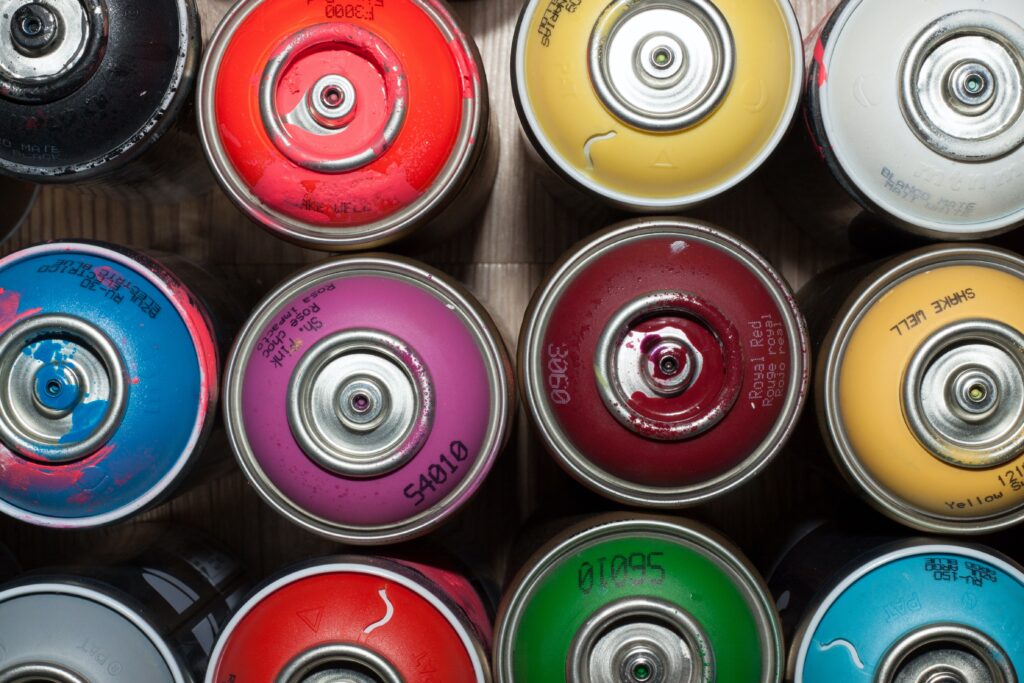We’re huddled in a patch of brittle chamomile stalks on the side of the road, spray paint cans in hand. I swat at the cloud of mosquitoes, drawn by the saccharine aroma of our raspberry and melon body splashes. It’s a summer night in rural Indiana, and I’ve never been out so late. The humid breeze does little to break the sweat seeping across the back of my tank top. My eyes follow a lone pair of headlights as they float over a blackened hill.
Now! Someone half-whispers, half-shouts. A flashlight beam hits a stop sign. Reds first!
I try to catch up with the gleam of Sara’s blonde pixie cut. Clack, clack, clack—she shakes her can, so I shake mine.
Sara’s cousins—three girls—are leading us. I’d met them earlier that night. We’re staying in a camper in their yard, on our way from my house in the Chicago suburbs to Georgia, where Sara recently moved.
I was surprised my dad let me come on this road trip—I’d never traveled without family before. But it had been a few years since my mom died by then, and he seemed less and less sure of what to do with me. First, the Seventeen magazines started showing up. Your mother read that when she was young, he said, while the first issue sat on the counter with the rest of the mail, my name printed on the label. Earlier that summer, he handed me the cracked, blue case with my mother’s electric razor: For shaving your legs, he said, before retreating to his bedroom for the night. I also didn’t think he liked Sara. She’s so loud, he’d complain after she’d gone home and our house would resume its subdued state. But he must have known being thirteen meant something, so he let me go.
Back in that cornfield, three or four of us run up to the stop sign and start waving our cans wildly, jamming our fingers into the button, filling the night air with a swarm of shhhh’s and a smell that reminds me of rotten eggs as the word “STOP” disappears under the red.
That’s enough, says Mel, who’s sixteen and seemingly all-knowing. She steps forward with the can of white paint, her rail-thin frame the only one tall enough to reach. Clack, clack, clack. Watch for cars.
We immediately twist our bodies towards the road, but its blackness stays still. Mel stretches up to the sign’s center, pushing back the mass of untamable, choppy red curls around her head. Her arms extend in broad, balletic gestures as she scrawls the word in round, uneven letters: “CHILL.”
We forget ourselves and erupt into a chorus of shrieks.
Shhhh. Mel’s Cupid-bow mouth smirks. But we’re all in on it. We kick up clouds of dirt as we run back to the house, then pile onto Mel’s bed, and I admire her walls, sponge-painted in thick, saturated puddles of purples and pinks and teals.
I did it myself, she says as she leans over to hit play on the boombox. Jagged Little Pill starts spinning, but we beg Mel to skip to “You Oughta Know” again—a brand new song. Alanis’s crescendo of moans silences the room: the quiet vulnerability of I want you to know, followed by the uninhibited scream of I’m still alive. I had never heard it before that night but suddenly, desperately needed to shut my eyes and snarl and scream, too—though mostly scream; everyone else is screaming.
The next week, back in Illinois, my father asks me about my trip. I tell him about the easy Georgia things—the waterparks and laser show and shopping malls. But I also make a point to tell him about a stop sign I’d seen.
Someone wrote “CHILL” over the “STOP.” I know it’s bad but—isn’t it kind of awesome, too?
Why would anyone do something so dangerous? What if someone didn’t understand?
I wanted to argue. That everyone has to let go sometimes. That I didn’t anticipate accidents on the horizon, at least not back then. That it was in the middle of an empty cornfield. But I didn’t say anything. I just reached for my headphones and hit play.
—
Photography by: Ehimetalor Akhere Unuabona
